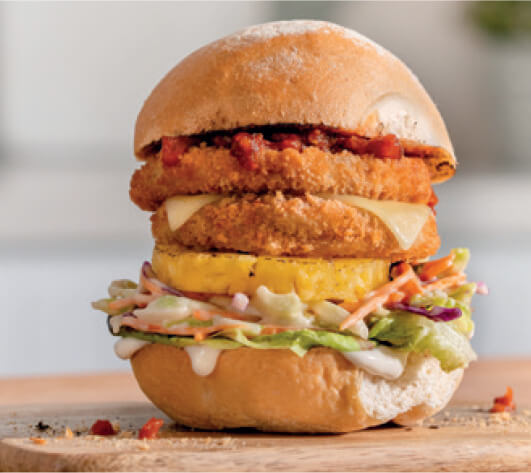The Fry family is an impressive one, having started a vegan company back when plant- based eating was still a fringe movement. Yet, that didn’t stop them; using their own family likes and dislikes paired with sound values and solid product research, they grew the vegan food company to the success that it is today.
Vegan Trade Journal chatted to Tammy Fry, global brand lead and co-founder of
The Fry Family Food Co. (and member of the Fry family) about how and why it all got started.
Tell us about The Fry Family Food Co.
Founded 30-years ago, the vision of ‘principles before profit’ has been the driving force behind international plant-based pioneering brand The Fry Family Food Co.It was started in our family kitchen by my dad, Wally Fry, who wanted to find a wayto replicate the taste and texture of meatin plant-based meat alternatives for us (his family of vegetarians). It was an incredibly innovative idea at the time as vegetarianism was almost unheard of in South Africa.

I like to believe it was my
parent’s commitment to
eating kindlyand helping
others do the same that
fuelled Fry’s growth.
I like to believe it was my parent’s commitment to eating kindly and helping others do the same that fuelled Fry’s growth from our family kitchen into a global supplier of plant-based products that include meatless burgers, sausages, schnitzel, nuggets, seafood, mince and more. Our diverse range of products give consumers far more choice and variety and enables them to create their favourite meat-based recipes using plant- based alternatives. Today, we have more than 40 products on supermarket shelves in 30 countries around the world.
Why was the company first founded?
Fry’s started in the early 1990’s at a time when veganism, and the concept of swapping meat for plants, was almost unheard of. Fry’s was founded by my parents Wally and Debbie Fry in South Africa off the back of my dad’s mission to create tasty and nutritious meat-alternatives using plant-based products.
What makes your products different to other plant-based meat-alternatives out there?
We continue to be unwavering in the quality of ingredients we use in our products. All our soya is non-GM and is rigorously tested for pesticides and herbicides. Our quality standards in production remain some of the highest in the industry – standards that were set and maintained by my dad when we rst started mass producing decades ago. We also have a very high standard when it comes to new product development, ensuring that all new products are of the highest taste and texture standard. As a family business we have always approached our product development with the family in mind – if it’s something we know our family will love, then we know other families will love it too.
Why do consumers enjoy Fry’s products?
I believe it’s because they know theycan trust in the standard. Fry’s has also increased its product range with familyin mind – offering increased variety to consumers and creating more opportunities for families to enjoy their favourite meat-based recipes such as cottage pie, spaghetti Bolognese, sh and chips and burgers using plant-based ingredients.
How do you ensure you’re catering to consumer demand?
We have a number of approaches. Essentially, we do a lot of ‘listening’ to consumers through feedback on our social media and through retail demand. Wehave also had access to category focused market research which has in many ways driven some of our innovation strategy. And then we also have ‘gut feel’. Our family are vegans and vegetarians and we often turn to our inner-circle to understand what sorts of products we would like to see on our dinner table. Sometimes it’s a combination of all of these.
How does Fry’s try to appeal to exitarian and omnivore consumers? Do you think it is important for vegan meat brands to do so?
Absolutely! We have always believed in creating a supportive environment for people to reduce their meat intake and explore more plant-based foods. I believe that creating a ‘non-judgemental’ solution gives people the space and time to play with the idea of eating less meat. Our products are designed to be tasty and nutritious meat-replacements (with a strong focus on texture), so that families have access to alternatives across all meal occasions – making plant-based an easy option for everyone around the table.

How have you seen sales increase over time?
Over the last few years, we’ve seen a steady 30 – 40 per cent increase globally yearon year. We don’t anticipate this slowing down, especially now that we are part of the LIVEKINDLY Collective (thelivekindlyco.com) and are exploring growth into multiplenew territories.
Is there a certain sector within the vegan meat products market, that you have seen gain greater market share?
I have found that the demand doesn’tseem to be driven by speci c products but rather by brands that are doing specific products really well. Of course, there are certain products that do better in different territories (burgers and sausages do really well in South Africa and Australia, while our chicken-style products and pies tend to do well in the UK) but generally we nd that when one brand does a really good product, the consumer demand picks up for that type of product – and then the other brands and retailers respond accordingly.
How do you predict the vegan meat- alternative market will change over the next ve years?
It’s fascinating to track the changes and growth in all the different territories. Lots of differences, but also a lot of similarities. For example – ongoing growth and demand by consumers, retailers and food service seems to be consistent globally. We are definitely seeing a stronger interest from the big players which will increase competitiveness and ultimately grow the category. And on the flip side, we are seeing space for smaller, more artisanal brands too. So, like all food categories we will start to see more and more of a broader rangeof products. We are definitely moving toa place where meat alternatives will be a normal, mainstream offering in manymore countries.
Have you had to adapt the business at all, to navigate the Coronavirus outbreak?
Not enormously. The majority of our products are produced in South Africa and throughout the pandemic food production has been prioritised as an essential service by the government so there has been a lot of support to ensure consistency to the business.
What does the future look like for Fry’s?
As part of our partnership with LIVEKINDLy Collective we will soon see some exciting expansions in new territories. We launched in the USA this year and that is going to be a huge growth point for us. We arealso putting more energy into innovations and will be working on some exciting new products for late 2021 and 2022, as well as some important improvements to some of our old favourites. The future looks very rosy indeed.
This interview was first published in Vegan Trade Journal, Issue 21, Autumn 2021. Read the article online here.
For more from Fry’s, visit fryfamilyfood.com and follow them on social media:
Instagram @frysfamily Facebook @TheFryFamilyFoodCoUK Twitter @frysfamilyUK


